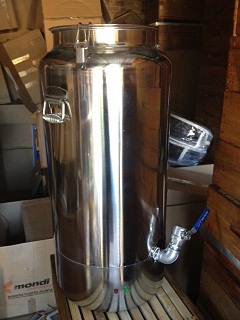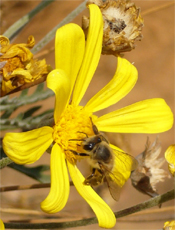Honey Bee Articles
- Perfect honey storage - the honeycomb
- Super structure - the beehive
- Make money from honey
- Swarm Catcher - Catching bee colonies
- Queen Bee Maker - Breed queen bees
Perfect Honey Storage - the honeycomb
Honey bees have been harvesting nectar and pollen for millenia. The bee design has stood the test of time. Bees keep their families, their young and their queen in specially designed cells. One of these cells in a massive collection is referred to as the honeycomb. It's where the perfect honey storage unit is found.
Read more on the honeycomb here...

Super structure - the beehive
The beehive is a massive interdependent super structure that man is still trying to emulate in the world's most complex and developed cities. We could take a leaf out of the honey bees' book on planning and utilisation of space and resources. In little less than one metre squared, up to 100 000 honey bees have been estimated as living harmoniously together. There is every element of human dwelling and utility provided for in the super structure. Military, mother, father, nursing, provider, breeder, storage, water supply and traffic to manage. The beehive is a super structure...
Read more on the beehive: a super structure...
Make Money from honey
Is farming dead? Not likely! With more and more emphasis being put on food security governments and private entities are recognising the efficacy and value of increasing yields on crops, fruit and other commercial plants. Where do you come in? As a beekeeper you have the opportunity to enter a niche market that is going to have millions of dollars invested in it in order to improve crop yield for food security! The bonus is that you make money from honey harvested every crop you pollinate! And that's not all.
Read more on Making money from honey here...
Swarm Catcher - Catching honey bee colonies
We are currently finishing the latest bee book in a series on starting beekeeping that gives you a tried and tested method to catch honey bee colonies. In South Africa, there is such an abundance of wild or feral honey bee colonies that there is little market for selling colonies. If we can teach you how to catch honey bees what would that be worth to you? Our Swarm Catcher mini report is now available!
Queen Bee Maker - Breeding queen bees
Once you have bee hives and manage your own honeybee colonies how can you grow? The best method of developing your apiary is to breed with existing queen bees that have good temperament and produce good honey. A number of ways exist to breeding queen bees and we show you how in our mini report, now available, called the Queen Bee Maker!
Find out more about bee books now
Website designed by: www.promoting4u.com
Photos are the property of BeeHives.co.za or third parties and are not for use without written permission.

